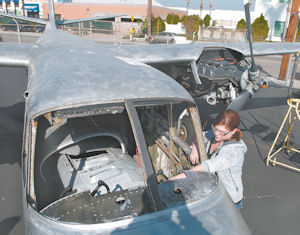As the Valley’s adult education schools prepare to shut down next year under a worst-case $6 billion budget approved Tuesday by the Los Angeles Board of Education, some area schools held out the slight hope that at least some of their most important programs could be salvaged. That would include the North Valley Occupational Center’s aviation school at Van Nuys Airport, an important Valley economic asset with a long history of placing low-income and working class students in good middle class jobs. “We remain hopeful that there will be some money there next year,” said Principal Carlynn Huddleston, “though at this point the official budget is zero.” Should some of the programs survive, they will very different, Huddleston said, with much higher fees. She said under a best-case scenario, she expects a 60 percent cut to North Valley’s programs and a five-fold increase in fees. Adult education is one of several LAUSD programs that will be completely eliminated should the budget approved last week stand. As of last week, that budget was $390 million short and school officials are facing the tough task of eliminating not only adult education but early childhood education and arts programs throughout LAUSD to plug the hole. LAUSD Superintendent John Deasy held out the hope that more state money will be forthcoming, and that unions will agree to furloughs that could result in an additional $60 million. “We’re hopeful, but not overly optimistic,” said LAUSD Communications Director Tom Waldman. The deficit that was presented to the Board of Education was actually less than what was anticipated earlier this year, when the district was projecting a shortfall $577 million. Waldman said the $187 million adjustment came from the restoration of cuts to bus transportation, higher than expected lottery revenues and lower than expected benefit costs as a result of last year’s layoffs. He said the money will enable the district to preserve classes and career training for current high school students who are enrolled through the adult education program, but not regional occupational centers or adult programs. “As of now, adult education will be almost completely eliminated,” Waldman said. “We had to give priority to high school students served by the program.” Should the worst-case budget stand, a staff of 1,900 full-time equivalents will be laid off from the adult education program citywide. The district sent out 11,700 pink slips last week as part of its preparation for that scenario. The budget approved March 13 is still an interim one, and could change before the district has to submit a final plan to the state in June, Waldman said. There is also the hope that taxpayers will approve a $298-per-parcel tax in November that could give LAUSD additional ongoing revenues of $255 million a year. As it stands now, however, centers like North Valley, along with the West Valley Occupational Center — which together prepare some 17,000 Valley residents for practical jobs in fields from auto mechanics to photovoltaics and health care – will close come September. West Valley Principal Veronica Montes was discouraged. “Until we have some definitive answers, how do we plan for $0?” she asked. At North Valley, Huddleston is preparing for a scenario of steep cuts — as much as 60 percent— and huge fee increases, in the event some funds become available. Huddleston said she will strive to keep the programs that have a good track record of both attracting students and placing them in productive jobs, such as the aviation school program. Huddleston also is looking for other funding sources, such as qualifying the school for federal student loans and attracting private sector contributions. She has approached the Van Nuys Airport Association, which has expressed support for the school. Curt Castagna, president of the association, said the group is interested in exploring a partnership with the school, including potentially paying students who get placed in a job a success fee. “We haven’t had a formal discussion,” Castagna said. “We don’t know whether it (the fee) would go to the school or the student, but it could go a long way toward supplementing tuition costs.”
